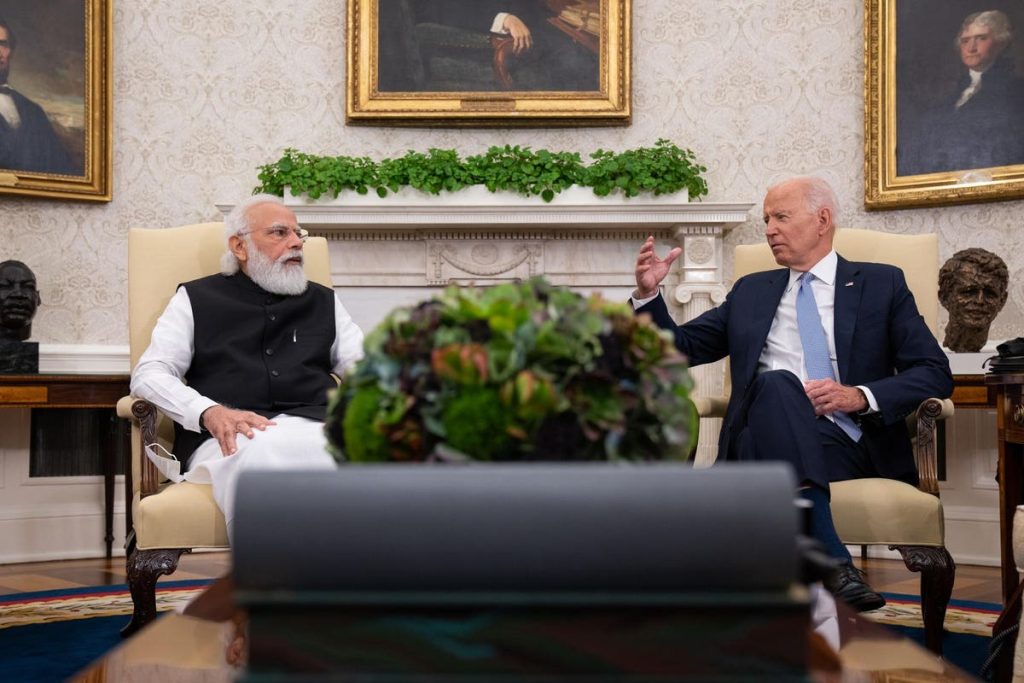President Joe Biden’s meetings with Indian Prime Minister Narendra Modi this week underscore India’s increasing prominence globally. The world’s most populous country, with more than 1.4 billion people, India boasts a rapidly expanding economy, a world-class tech sector, and universities that are educating computer scientists, doctors, and engineers. The CEOs of some of the world’s largest, most successful companies, including Google’s parent, Alphabet, and Microsoft were born and educated in India.
Modi has managed to maintain India’s relationships with the U.S. and other Western countries while still preserving strong ties to Russia, even in the face of Vladimir Putin’s brutal ongoing war against Ukraine. India has continued to import large volumes of Russian oil purchased at bargain prices. At the same time, Modi has strengthened economic and political ties to China, despite longstanding tensions between these two most-populous Asian countries.
The Biden administration’s decision to invite Modi for a state visit, only the third since the president took office, reflects the country’s strategic importance to the United States, including as part of the U.S. effort to counter China’s influence in the world. In the lead-up to Modi’s arrival in Washington, Jake Sullivan, the president’s national security advisor, termed it a “historic visit,” predicting “a significant number of announcements” related to military sales, technology, and energy. “This really, from my perspective, will be one of the defining partnerships of our age,” Sullivan said.
Recognizing the U.S. national interest in strengthening relations with India, Biden nevertheless needs to challenge Modi about the deteriorating human rights situation in India, especially the rampant discrimination against its 200 million Muslim citizens. Observers such as Professor Hal Brands of Johns Hopkins University’s School of Advanced International Studies have argued that some diplomatic relationships are “too strategically important to hold hostage to concerns about democratic values.” I disagree. Even if Biden confines discussion of the topic to their private meetings, the U.S. president needs to underscore disapproval of Modi’s support for an increasingly virulent form of Hindu nationalism, which is leading to widespread mistreatment of Muslims. Specifically, he needs to challenge the Modi government’s offering of a measure of impunity to right-wing vigilantes who have attacked mosques and Muslim leaders.
In the city of Khargone, for example, where communal tensions led to clashes last year between Hindus and Muslims, the government swiftly demolished Muslim homes without any legal review. Home Minister Narottam Mishra justified these arbitrary actions, saying: “The houses from where the stones were pelted, we will turn those houses into piles of stone.” This pattern of summary retaliation against Muslims has occurred in a number of other places in India since Modi was first elected in 2014. In an open letter to the Indian prime minister earlier this year, more than 100 retired Indian senior civil servants called for an end to what they termed “vigilante violence,” which they said had “embedded itself deep in the recesses of the structures, institutions, and processes of governance.”
Modi’s government also has politicized the courts, including undermining the independence of the country’s once-respected Supreme Court. The government also has targeted human rights defenders in Kashmir, where it has a long history of cracking down on critics of government actions. Mary Lawlor, the UN Special Rapporteur on Human Rights Defenders, wrote in March that “Indian authorities appear to be intensifying the long-standing repression of Kashmiri civil society.”
The Indian government also has tried to suppress criticism conveyed by both traditional news outlets and social media. In April, the government enacted legal changes to prohibit social media firms from publishing, hosting, or sharing false or misleading information about “any business” of the government. These companies now will be required to rely on the government’s own fact-check unit to determine the authenticity of any claim. The government also has used internet shutdowns to quell opposition voices. According to Human Rights Watch, it has shut down the internet more than any other country in the world since 2018, including 84 such episodes in 2022.
The government’s response to a recent BBC documentary called “The Modi Question” illustrates its intolerance of free expression. The documentary examines Modi’s leadership as chief minister of the state of Gujarat in 2002 when more than 1,000 people were killed in riots between Hindus and Muslims there. Since the documentary’s broadcast in the U.K. in January, the Modi government has attempted to block online sharing of the work, calling it “hostile propaganda and anti-India garbage” reflecting a “colonial mindset.” Shortly after the broadcast in the U.K., the BBC’s Delhi offices were raided by Indian income tax authorities. In April, the government announced an investigation of the BBC for alleged violations of India’s foreign exchange rules.
Some critics have castigated President Biden for making the case for supporting democratic governments while condemning authoritarian leaders during his presidential campaign but failing to maintain that distinction when strategically important autocratic leaders like Modi have come to town. Again, I disagree. Governments cannot be placed into binary boxes. India is indeed the world’s largest democracy, and Modi is a highly popular elected leader of that country. But he also is taking a number of actions that violate human rights, especially with respect to minority and vulnerable communities in India that are not part of his political base. It is incumbent on President Biden and his aides to raise these concerns and make clear that promoting human rights is an essential element of U.S. policy.
Read the full article here










